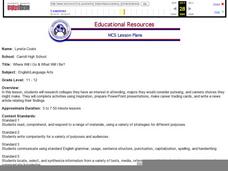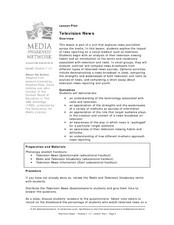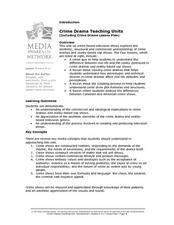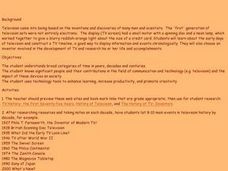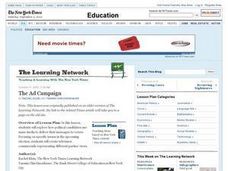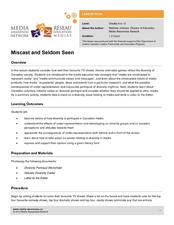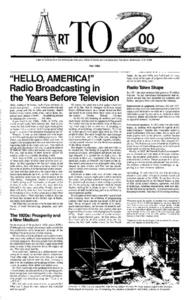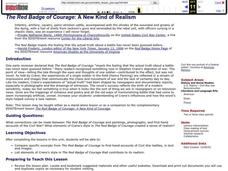Curated OER
Art Reflecting Life
Have your young television viewers discuss popular shows among their peers. After choosing one show to analyze, middle and high schoolers read about the 2007-2008 network television lineup with the New York Times article "Gauging...
Curated OER
Where Will I Go and What Will I Be?
Help your future college graduates prepare for higher education with this series of lessons. High schoolers complete research projects about the colleges they would like to attend, and create PowerPoint presentations about their careers...
Curated OER
Media Literacy: TV - What You Don't See!
Students examine how to evaluate what they are watching on television. They discuss hip hop music videos, compare/contrast them to other types of music videos, write a letter or press release about promoting positive teen stories, and...
Curated OER
Television News
Different media sources portray news in a variety of ways. In groups of three, learners look at different news sources, bringing in all the findings the next day. Three handouts help scholars compare sources, define specific terms used...
Curated OER
Tee-Hee T.V.
Students examine the concept of satire by reading lyrics to a song and reading "Soap and the Campus: A Web-Site Spoof Succeeds." They create treatments for parodies based on current television shows.
Curated OER
Who Pays for My Favorite Television Program?
Ninth graders analyze media messages. In this media messages lesson, 9th graders identify techniques in television commercials that appeal to the senses and emotions. Students analyze the elements in example ads. Students keep journals...
Curated OER
TV and Teaching
Students write a story centered around their favorite TV show. In this story writing lesson, students share their favorite TV shows and discuss their favorite characters. Students draw pictures that illustrate a story in which they are a...
Curated OER
Crime Drama Teaching Units
Investigate the nature of crime dramas on television. What exactly are they trying to portray? Questions and a comparison chart support learners as they watch shows from Canada, Great Britain, and the United States. An oral presentation...
Curated OER
Winter Olympic Games Project
Learners research an individual event on the Internet during the winter Olympic games. Students learn about their event, watch it on TV, follow it on the Web, and acreate a poster that sharing their new knowledge about that sport.
Curated OER
Rewrite, Revise, Recycle
Learners examine different pieces of literature that have a similiar theme. They read an article about reusing ideas for television shows. They work together to create their own program proposals. They also create backstories for one of...
Curated OER
History of Television
Young scholars investigate the history of Television by using the Internet. In this timeline lesson, students discuss and take notes on the 10 main events in Television history and create a timeline through education software....
Global Oneness Project
The Value of Ancient Traditions
Imagine having to give up cell phones, computers, and TV? What would be lost? What gained? An examination of the Drokpa, a nomadic people who live in the grasslands of Tibet, provides class members an opportunity to consider how access...
Curated OER
Class in the Media: Writing a Television Show
Learners look at popular media presentations to determine what type of messages they convey about class and class-linked behavior. They listen to contemporary music to explore how the songs touch upon social class issues. They read...
Curated OER
Information Overload: Looking at News
How do events reported in mainstream newspapers, on television news, blog posts, and social network sites differ? Ask your class to investigate the way the same news item is presented in the many information sources available. Groups...
Curated OER
Children's Media and Censorship
High schoolers form opinions about children and television censorship after analyzing literature. They complete a journal writing activity to identify the topic and make a list of inappropriate television shows for children. Next, they...
Nemours KidsHealth
Sportsmanship: Grades 9-12
The increasing number of unsportsmanlike conduct penalties, red cards, and ejections from games points out the need for activities that help young people recognize behaviors that exemplify good sportsmanship. For homework, class members...
Curated OER
The Electric Hearth
Students examine popular media. In this media awareness lesson plan, students keep logs of their interactions with media and then write an essay regarding the data.
Curated OER
The Ad Campaign
Students explore how political candidates use mass media to deliver their messages to voters. Focusing on specific issues in the upcoming election, students create television commercials representing different parties' views.
Curated OER
Miscast and Seldom Seen
Consider how well high schoolers' favorite TV shows, movies and video games reflect the diversity of society. The lesson plan introduces your class to several media literacy concepts, such as how media conveys values and messages, as...
Curated OER
Really Shocking
Students examine statistics about kidney transplants. In this current events lesson, students discuss the premise of the reality television show, "Big Donor Show." Students also discover the functions of the kidneys as well as the kidney...
Curated OER
Radio Broadcasting Before Television
Students compare the radio to other forms of mass communication. In this Radio Broadcasting Before Television instructional activity, students learn the different types of radio shows in the 1920s and 30s. Students write and perform...
Curated OER
Careers in science and careers that support scientific research
Examine some of the occupations which relate to science. Work in small groups of four. Group A is given a copy of a daily television guide to highlight all the television programs that have a science or mathematics focus. Group B is...
Curated OER
Talk Shows
Eighth graders are exposed to different types of media in order to investigate the tendency of being exposed to a set of values that run contrary to conservative values. They role play a television program in order to communicate the...
Curated OER
The Red Badge of Courage: A New Kind of Realism
Is it possible to tell a true war story? Tim O’Brien says that fiction is for “getting at the truth when the truth isn’t sufficient for the truth.” To get at the truth about war, class members examine primary source materials from the...

